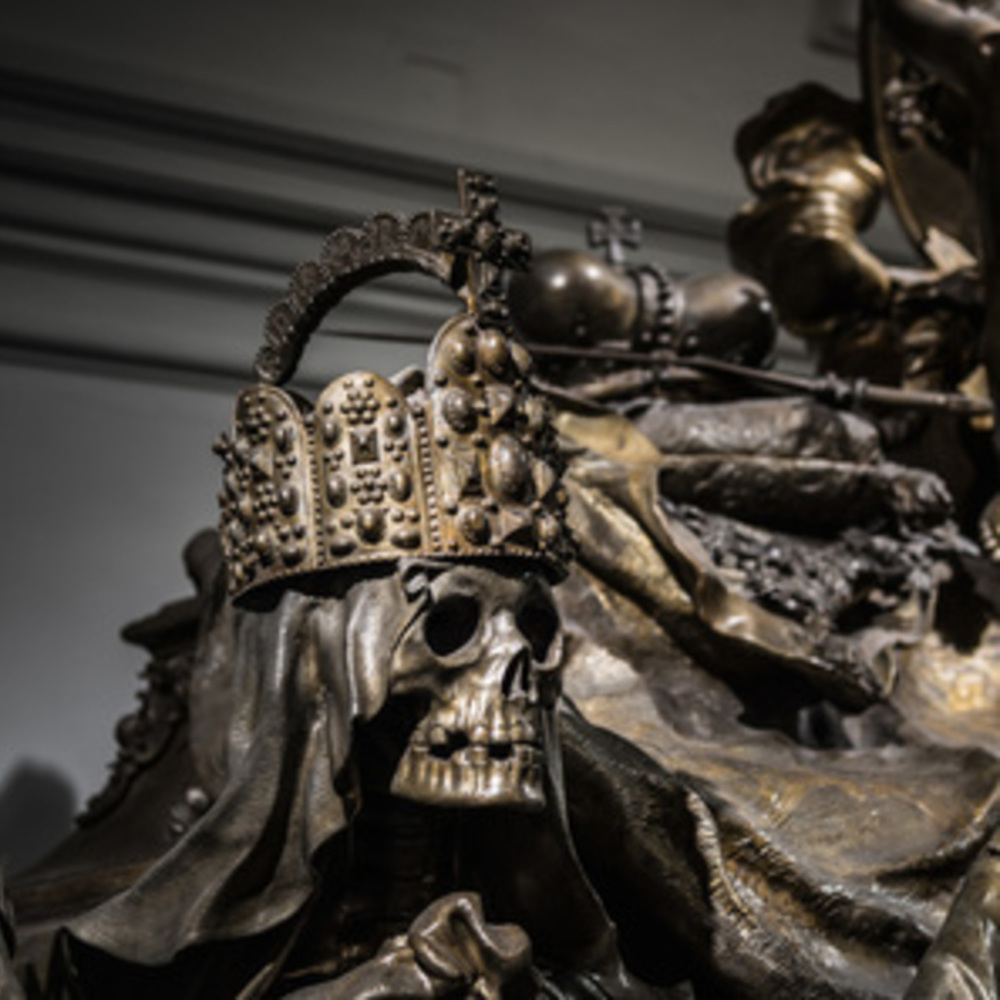
UNE VRAIE COMÉDIE
a real comedy
The coronation of the new British King Charles III seemed ancient with its rituals, the garments used, and the wealth on display.
No wonder—coronations also signify legitimacy and tradition.
Even in the 18th century, coronations seemed to come from another, even earlier time – such as the coronation of Joseph II in 1764.
On May 6, 2023, Charles III was crowned as the new British king. After his mother Queen Elizabeth's long 70-year reign, which even surpassed Emperor Franz Joseph's 68 years, it was the first coronation ceremony since 1953. In Europe, only in Great Britain are monarchs still actually anointed and crowned, and so the celebrations seemed like a spectacle from another era.
The coronation of Joseph II as King of the Holy Roman Empire in 1764 must have had a similar effect on many of his contemporaries.
On March 21, the electors arrived in the coronation city of Frankfurt and entered to the sound of cannon salutes.
The then 15-year-old Goethe, who was able to follow the celebrations as a resident of Frankfurt, wrote: “Until then, everything had been quite modern: the highest and most important persons moved about only in carriages; but now we were to see them on horseback, according to ancient custom.” The electors were clad in golden robes and wore ermine cloaks, and with their entourage they must have provided a spectacle the likes of which Frankfurt had not seen in a long time.
After the actual election ceremony, which took place behind closed doors in the inner sanctum of the cathedral and was closed to the public, Joseph was finally able to enter the city.
The procession was led by the Frankfurt stable master with drummers and trumpeters and three mounted companies of the citizen cavalry, followed by the ecclesiastical electors, who made an impression with their fleet of vehicles: the three electors from Cologne, Trier, and Mainz each brought 20 state carriages with them. Then came Joseph and his father Francis Stephen. And they easily surpassed the magnificent display of the electors. Among other things, 16 six-horse gala carriages drove in with them.
The coronation took place on April 16. A procession moved toward the cathedral. The secular electors rode with the imperial regalia, i.e., the imperial sword and orb, scepter, and imperial crown. They were followed by the king under a canopy, then his court and many dignitaries. The ecclesiastical electors received them in front of the cathedral, and after the solemn entrance, Mass began.
During the anointing, the king was stripped of his clothes. His undergarment had slits at strategic points through which the archbishop could anoint the king and through which the oil was then dried with cotton and rye bread.
The next part of the coronation took place behind closed doors: in the election chapel, the king was dressed in the coronation regalia, after which he was presented with the remaining imperial insignia back in the choir. He was girded with the imperial sword, put on gloves, and slipped the imperial ring onto his finger. He took the imperial orb and scepter and was finally crowned with the imperial crown.
The king then proceeded to the town hall, known as the “Romans.” This was followed by the balcony scene, where the emperor and king appeared before the people and waved to the crowd. On the square in front of the Romans, the electors now performed their traditional “hereditary duties.” The archchamberlain rode to a table set up there and took a silver washbasin from it. The arch-trucsess and arch-cupbearer took care of the emperor's physical well-being and brought him a piece of roast ox and a cup of wine. A kitchen for roasting the ox and a fountain from which red and white wine flowed had been set up in front of the town hall. The hereditary marshal took care of the imperial horse's physical well-being and brought oats from a pile of grain. The arch treasurer distributed money among the citizens of Frankfurt.
To those present, it all seemed like a spectacle from another era – after all, some medieval rituals and ceremonies were used, and ancient objects were displayed to illustrate the power and legitimacy of the empire.
Joseph II himself was not impressed by the ceremony: the young, modern monarch did not think much of the coronation. He was still mourning the great love of his life, Isabella, who had died just a year earlier, and he could not warm to the rituals of the past. The coronation robes and crown were too big for him, and the whole spectacle seemed ridiculous to him.
“The young king dragged himself along in the enormous robes with the jewels of Charlemagne, as if in a costume, so that he himself, looking at his father from time to time, could not refrain from smiling. The crown, which had had to be padded considerably, stood out from his head like an overhanging roof,” writes Goethe.
And Joseph II himself described it in a letter to his mother as follows: “une vraie comédie.” A true comedy, in other words.

